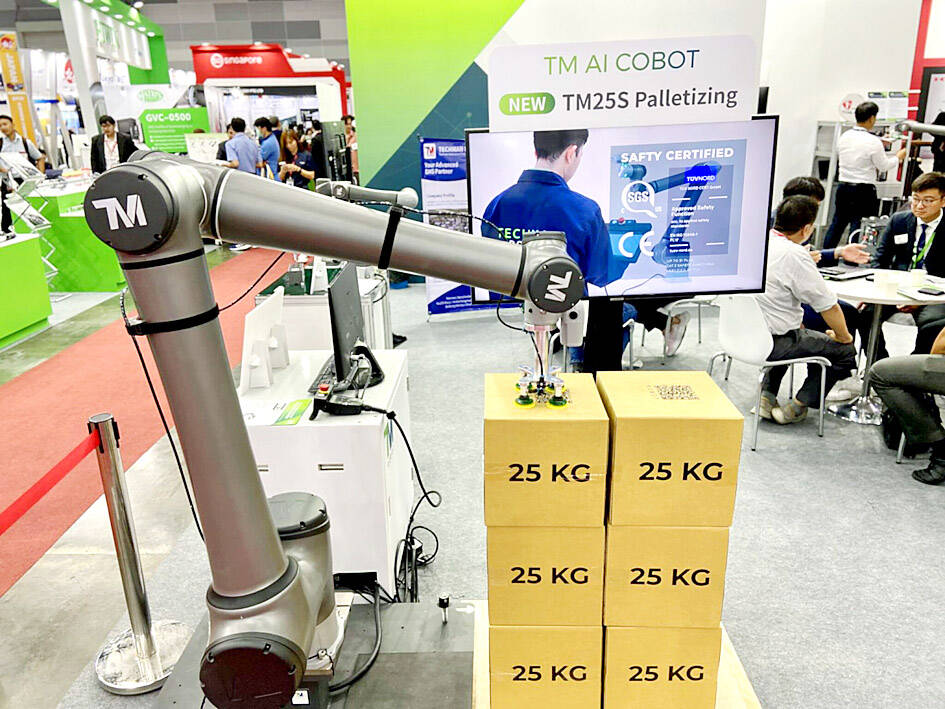The industrial production index in January increased 15.98 percent year-on-year, the Ministry of Economic Affairs reported yesterday, ending 19 months of consecutive declines.
Industrial production measures the change in the value of output produced by manufacturers, utilities and mines.
The ministry attributed the increase to improvements in manufacturing, mining, and electricity and gas supply output, coupled with a less serious deterioration in water supply output.

Photo courtesy of Techman Robot Inc
Manufacturing output, which accounted for 95.41 percent of the index, rose 16.63 percent annually in January, also ending a 19-month downtrend, the report said.
Output received a lift from robust demand for artificial intelligence (AI) applications, high-performance computing (HPC) and cloud data services, as well as the effect of firms stocking up ahead of the Lunar New Year holiday, it said.
However, the better-than-expected readings for industrial and manufacturing output were in part due to a lower comparison base, as the Lunar New Year holiday fell in January last year, which reduced the number of working days then, it said.
The ministry remains optimistic about a steady recovery in industrial and manufacturing output this year, thanks to robust demand prospects for AI, HPC, automotive electronics and high-end chips, the report said.
However, inflationary risks, the US-China rivalry, the Russia-Ukraine war and the Red Sea crisis would continue to weigh on the global economy, the ministry said, adding that a survey of local manufacturers found that production is expected to fall this month by 1.3 percent to 6.3 percent from a year earlier.
The computer and optical products industry reported the largest output increase of 35.3 percent in January, on the back of strong demand for servers, computer peripherals and handset camera lenses, ministry data showed.
The electronic components industry — which mainly comprises semiconductors and flat panels, and accounts for 49.57 percent of total manufacturing output — rose 10.73 percent, ending 16 months of consecutive declines, the report said.
In traditional industries, the effect of pre-holiday stocking helped boost output for base metals by 19.8 percent, chemical materials and fertilizers by 8.88 percent, and machinery manufacturers by 19.41 percent, the report said.
The automobile and auto parts industry remained a standout among traditional industries, with output surging 42.52 percent in January from a year earlier, mainly due to strong sales of several new vehicle models and rising orders for auto parts, it said.

SEMICONDUCTORS: The firm has already completed one fab, which is to begin mass producing 2-nanomater chips next year, while two others are under construction Taiwan Semiconductor Manufacturing Co (TSMC, 台積電), the world’s largest contract chipmaker, plans to begin construction of its fourth and fifth wafer fabs in Kaohsiung next year, targeting the development of high-end processes. The two facilities — P4 and P5 — are part of TSMC’s production expansion program, which aims to build five fabs in Kaohsiung. TSMC facility division vice president Arthur Chuang (莊子壽) on Thursday said that the five facilities are expected to create 8,000 jobs. To respond to the fast-changing global semiconductor industry and escalating international competition, TSMC said it has to keep growing by expanding its production footprints. The P4 and P5

DOWNFALL: The Singapore-based oil magnate Lim Oon Kuin was accused of hiding US$800 million in losses and leaving 20 banks with substantial liabilities Former tycoon Lim Oon Kuin (林恩強) has been declared bankrupt in Singapore, following the collapse of his oil trading empire. The name of the founder of Hin Leong Trading Pte Ltd (興隆貿易) and his children Lim Huey Ching (林慧清) and Lim Chee Meng (林志朋) were listed as having been issued a bankruptcy order on Dec. 19, the government gazette showed. The younger Lims were directors at the company. Leow Quek Shiong and Seah Roh Lin of BDO Advisory Pte Ltd are the trustees, according to the gazette. At its peak, Hin Leong traded a range of oil products, made lubricants and operated loading

The growing popularity of Chinese sport utility vehicles and pickup trucks has shaken up Mexico’s luxury car market, hitting sales of traditionally dominant brands such as Mercedes-Benz and BMW. Mexicans are increasingly switching from traditionally dominant sedans to Chinese vehicles due to a combination of comfort, technology and price, industry experts say. It is no small feat in a country home to factories of foreign brands such as Audi and BMW, and where until a few years ago imported Chinese cars were stigmatized, as in other parts of the world. The high-end segment of the market registered a sales drop

Citigroup Inc and Bank of America Corp said they are leaving a global climate-banking group, becoming the latest Wall Street lenders to exit the coalition in the past month. In a statement, Citigroup said while it remains committed to achieving net zero emissions, it is exiting the Net-Zero Banking Alliance (NZBA). Bank of America said separately on Tuesday that it is also leaving NZBA, adding that it would continue to work with clients on reducing greenhouse gas emissions. The banks’ departure from NZBA follows Goldman Sachs Group Inc and Wells Fargo & Co. The largest US financial institutions are under increasing pressure